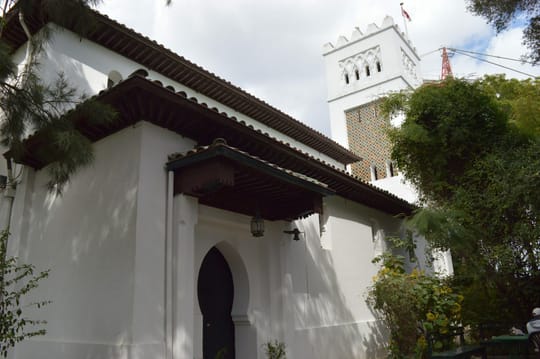Tangier’s St. Andrew’s Church: An Anglican Church with an Andalusian Style

I still recall my first time visiting St. Andrew’s Church in Tangier on February 14, 2020: a totally unplanned, enchanting discovery on a sunny Friday afternoon. As new students who had recently moved to the city for graduate school, a couple of friends and I decided to tour Tangier and visit its historical sites.
We walked down the street leading up to Grand Socco and passed by what seemed at first glance to be a mosque. However, the sign on the door read “St. Andrew’s Church.” My curiosity was piqued when we knocked on the door and a middle-aged man walked out with a prayer mat. He was the church’s guardian and offered to give us a tour inside after Al-Jumu’ah (Friday prayer) as he was about to head to the mosque. He let us in when he came back, and as I made my way into the church, I was completely baffled by the architectural features of this holy site; I was even more intrigued by the fact that this Anglican church was being maintained by a Muslim caretaker.
The USAID Dakira program, implemented by the High Atlas Foundation and its partners, aims to revive Morocco’s multicultural heritage and encourage the younger Moroccan generation to rediscover their multilayered identity by bringing to the fore stories of interfaith and intercultural solidarity. St Andrew’s Church, with its uniquely Andalusian architecture and the story of its guardian, stands as a model of centuries-old peaceful coexistence that is worth showcasing to the world. Hence, I returned to this site two years later and met once again with Yassine Khamlichi, 41 years old, the caretaker of St Andrew’s Church in Tangier.
The few first minutes I spent conversing with Yassine were more about the history of the place. The land on which this church is built was granted by Sultan Hassan I to Queen Victoria back in 1881. Construction work started in 1894, and the church was consecrated in 1905. The building was crafted using an amalgam of Andalusian and European styles with the help of both English architects and Moroccan Fassi craftsmen. It is the only church that has the Lord’s Prayer carved in Arabic around the chancel arch. The bell tower takes the form of a minaret, and green Fassi tiles decorate the rooftop. It is open to the public all week long except for Friday. According to Yassine, this holy site has become more of a museum than a church and receives visitors from across the globe.
The church yard includes a cemetery wherein several prominent figures were laid to rest. They are originally from the United States, Australia, and England, as well as throughout Europe. Their stories make this graveyard a unique place of memory. Nestled among the headstones at St Andrew’s Church at the entryway are four graves of fighter pilots who were shot down in Morocco during World War II. On the western side of the graveyard stands a memorial plaque that commemorates Emily Keen, known as Cherifa of Ouezzane, a British expatriate who introduced the cholera vaccine in Morocco and married Hadj Ahmed Ben Abdesslam, the Cherif of Ouezzane and a local Muslim leader. Although she was Christian, she was buried in her family plot at Dar Dmana in Tangier. Also buried here in 2018 was Christopher Gibbs, the British antique dealer and interior designer who also served as the churchwarden for some years. Another interesting story is that of Walter Burton Harris, a former news correspondent for The Times. His European-Moroccan style villa is one of Tangier’s most renowned historic landmarks as it was recently renovated and turned into a contemporary art museum.
Yassine has been taking care of this church for fourteen years. When I inquired about the reason he chose this particular job, he said, “My father was friends with an English man, and he offered me this job. At first, I was hesitant and feared the perception of the locals. But I strongly believe that everyone is free to practice their own faith. I am Muslim, and I have always enjoyed meeting people from all walks of life and learning about their religions and cultures.”
“This cool oasis in the city,” as Christopher Gibbs described it, welcomes all types of visitors, including many foreigners. But since the Covid-19 pandemic broke out and restrictions were imposed on international travel, this situation has offered a chance for local people to rediscover their heritage. Thus, the site has gained more fame recently among the members of the community. Yassine added that the Anglican community of Tangier has decreased significantly and that the church has been welcoming new parishioners, notably migrants from sub-Saharan Africa. Today, St. Andrew’s Church stands as a reminder of the insuperable harmony between the three Abrahmic religions, which is the very essence of Tangier and part of what makes the city’s social and cultural fabric so rich and unique.
—
Soukaina Kherdioui is a cultural coordinator for the USAID Dakira program. Dakira, implemented by the High Atlas Foundation and its partners, aims to strengthen inter-religious and inter-ethnic solidarity through community efforts that preserve cultural heritage in Morocco.
This article was completed with the support of the United States Agency for International Development (USAID), and the High Atlas Foundation is solely responsible for its content, which does not necessarily reflect the views of the USAID or the Government of the United States.